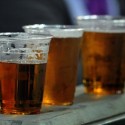Drinkers’ Red Face May Signal Cancer Risk
People whose faces turn red when they drink alcohol may be facing more than embarrassment. The flushing may indicate an increased risk for a deadly throat cancer, researchers report.
The flushing response, which may be accompanied by nausea and a rapid heartbeat, is caused mainly by an inherited deficiency in an enzyme called ALDH2, a trait shared by more than a third of people of East Asian ancestry — Japanese, Chinese or Koreans. As little as half a bottle of beer can trigger the reaction.
The deficiency results in problems in metabolizing alcohol, leading to an accumulation of a toxin called acetaldehyde in the body. People with two copies of the gene responsible have such unpleasant reactions that they are unable to consume large amounts of alcohol. This aversion actually protects them against the increased risk for cancer.
But those with only one copy can develop a tolerance to acetaldehyde and become heavy drinkers.
“What we’re trying to do here is raise awareness of this risk factor among doctors and their ALDH2-deficient patients,” said Philip J. Brooks, an investigator with the National Institute on Alcohol Abuse and Alcoholism, and an author of the report published Monday in the journal PLoS Medicine. “It’s a pretty serious risk.”
The malignancy, called squamous cell esophageal cancer, is also caused by smoking and can be treated with surgery, but survival rates are low. Even moderate drinking increases the risk, but it rises sharply with heavier consumption. An ALDH2-deficient person who has two beers a day has 6 to 10 times the risk of developing esophageal cancer as a person not deficient in the enzyme.
Reducing drinking can significantly reduce the incidence of this cancer among Asian adults. The researchers calculate that if ALDH2-deficient Japanese men reduced their weekly consumption to fewer than nine drinks, 53 percent of esophageal squamous cell cancers in that group could be prevented.
source: New York Times


